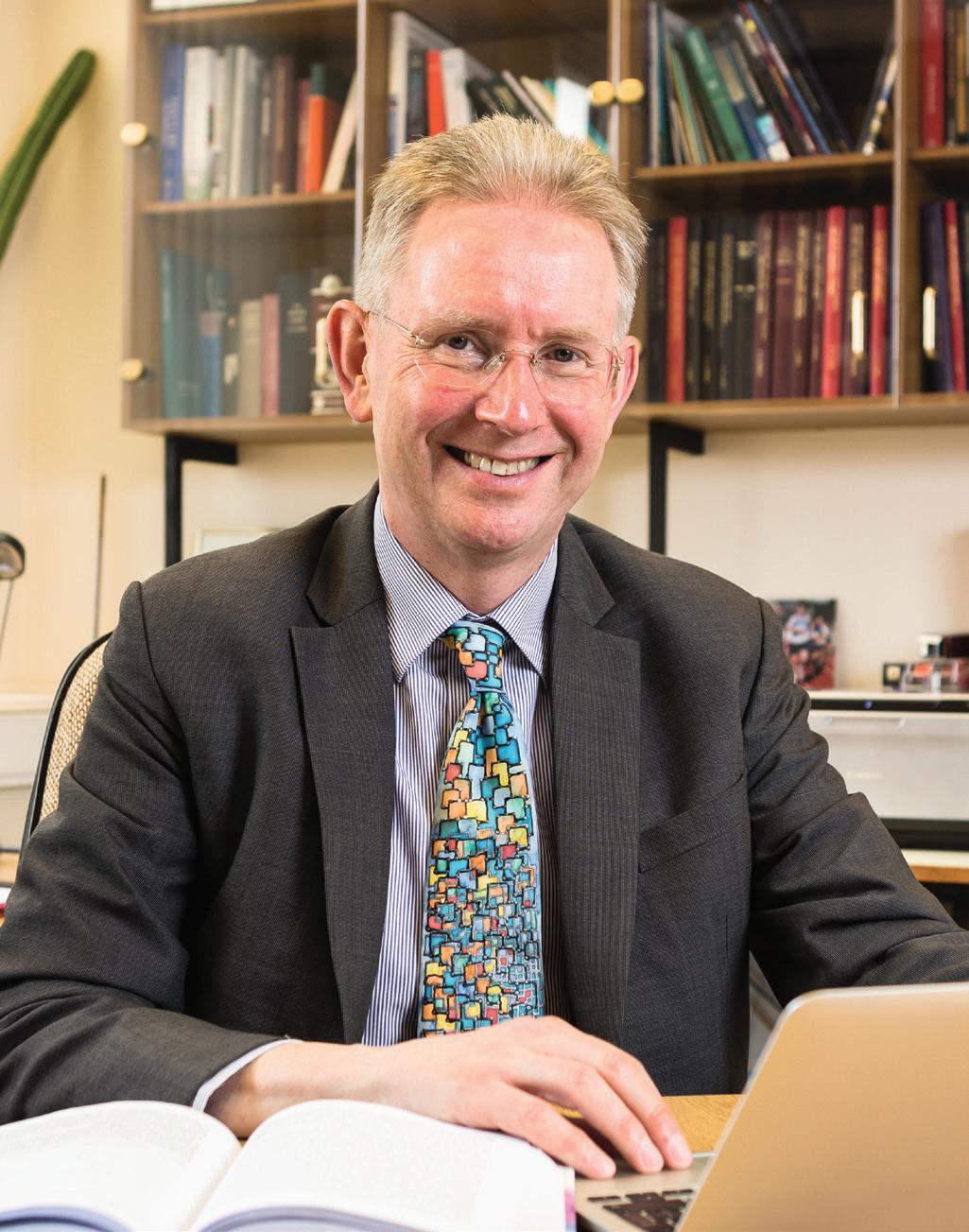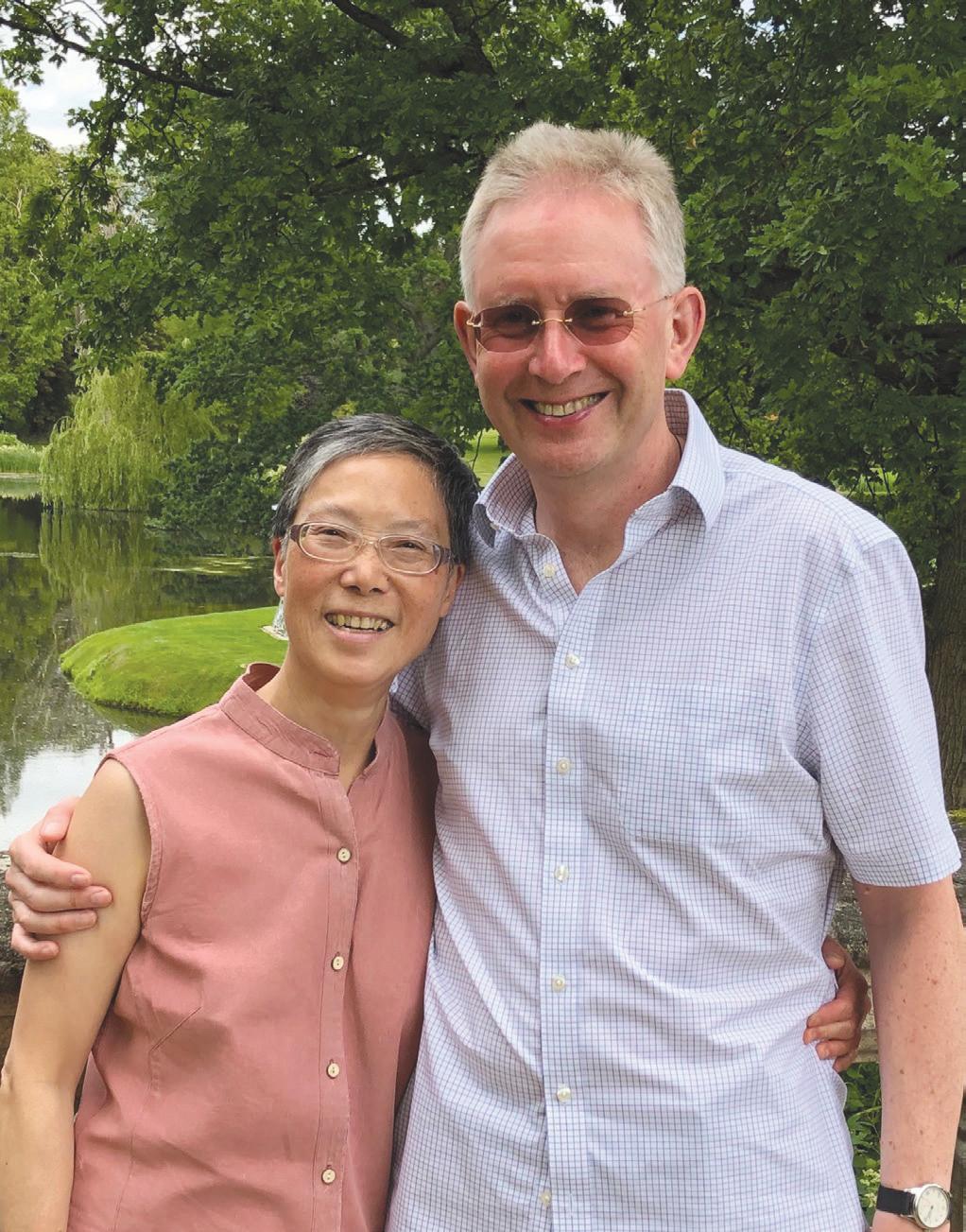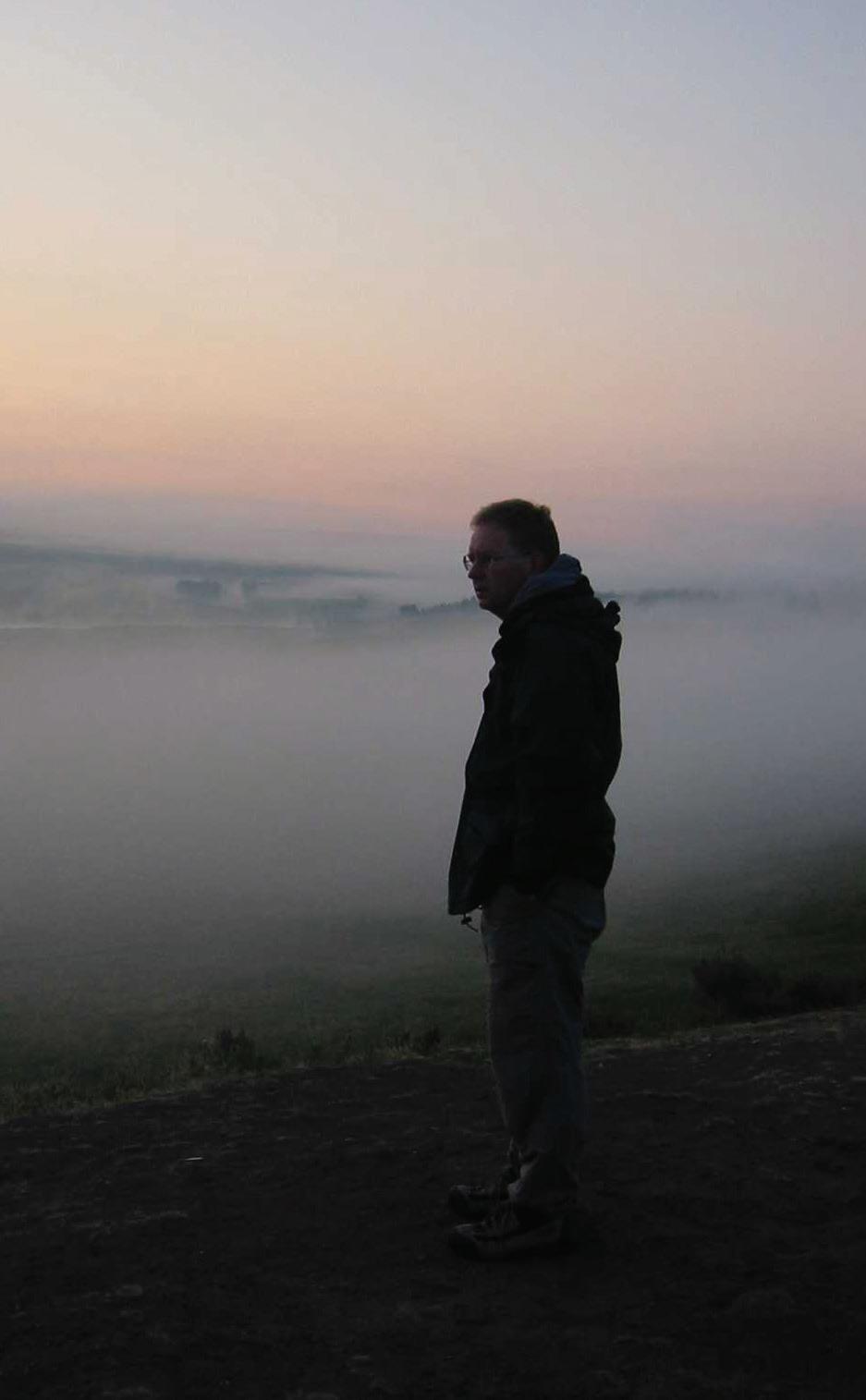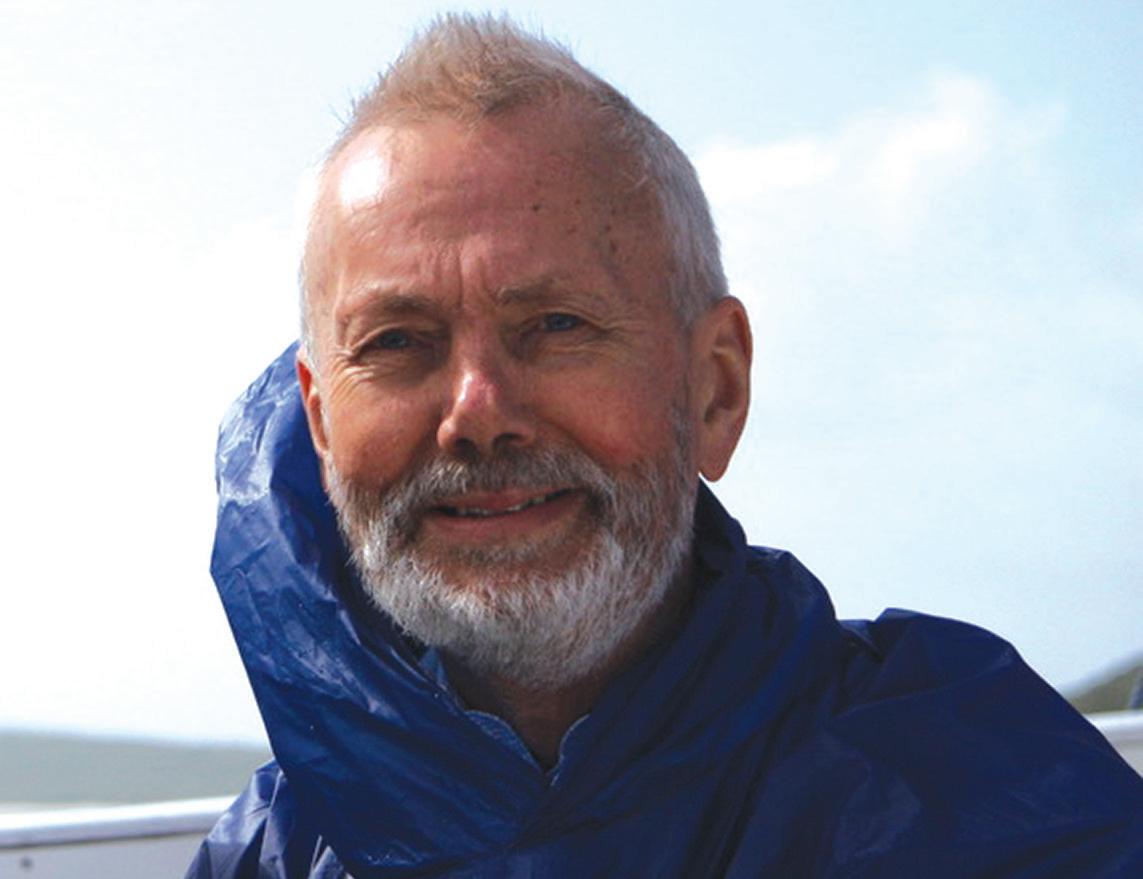
6 minute read
Professor Chris Abell 1957–2020
Professor Chris Abell FRS, FMedSci, Professor of Biological Chemistry and Pro-ViceChancellor for Research, died suddenly on Monday 26th October 2020, just short of his 63rd birthday. Dr Finian Leeper has provided this account of his research and life.
Nathan Pitt

Chris at his desk
Chris’s research spanned studies into the biosynthesis of natural products, enzymic reaction mechanisms, microfluidic microdroplet reactors, and most notably fragment-based drug design. He co-founded Astex Pharmaceuticals to exploit this technique, which has transformed pharmaceutical research worldwide. As Pro-Vice-Chancellor for Research he spearheaded many of the University’s research initiatives, while remaining a loyal supporter of the Chemistry Department.
Chris was the son of a farmer in the village of Gateforth in Yorkshire. He studied at Selby Grammar School and
Chris and Katherine
was the first in his family to go to university. I met him within days of his arrival at St John’s College, Cambridge in 1976 to read Natural Sciences, As a second year PhD I had just started to tutor first year undergrads – Chris and his supervision partner Tim were my first supervisees and I was their first supervisor. I was very inexperienced but fortunately Chris and Tom were my first group each week, and taught me what I needed to teach my other groups. Forty-four years later I was still learning from Chris, as so many of us were.
Chris specialised in Chemistry (despite my inept supervisions ) and graduated with a first in 1979. I
Chris in his lab in 1980

returned to Jim Staunton’s group in Cambridge from a Chris also started projects on combinatorial chemistry. postdoc abroad to find that Chris had also joined as a PhD Shankar Balasubramanian (now Prof. Sir Shankar) was one of student. During this time Chris pioneered the use of dual his early PhD students and worked in this area. I collaborated isotopic labelling techniques in polyketide biosynthesis. with him on another interest, catalytic antibodies. He also met Katherine, who was doing her PhD in the same lab (lab 122) with Tony Kirby, and they were Gradually, however, Chris’s interest shifted to the married while still graduate students. development of enzyme inhibitors. He and Prof. Sir Tom “In the 1980s, lab 122 was a Blundell promoted the fragment-based In 1982 Chris left for postdoctoral research mixed lab. Chris had a bench in approach to drug discovery, which proved in the US with Prof. David Cane at Brown the middle of this big lab. My to be far more efficient than the strategies University, studying the biosynthesis of bench was at the other end, most pharmaceutical companies were terpene antibiotic pentalenolactone. and it was natural for us to pursuing at that time. On the back of This was the start of a lifelong friendship socialise within our respective these results Chris, Tom and Harren Jhoti between Chris and David, which included research groups. Many months founded Astex Pharmaceuticals in 1999, many joint family holidays, and my family passed by before one fateful which continues to be very successful, was lucky enough to be included in these evening we were both working with three drugs already on the market. as well. late. He walked by my fume The use of fragment-based drug discovery cupboard and said hello. The continued in Chris’s research group, where In 1984 Chris returned to Cambridge to rest is history, as they say.” it was used to target enzymes associated take up a lectureship, bringing the newly with diseases such as tuberculosis, cystic established techniques of gene-cloning Katherine Abell fibrosis and cancer. with him. He applied these techniques in his own research on enzyme mechanisms, and also, assisting Chris’s research on microdroplets also took off. These Prof. Alan Battersby (a role I shared), to the biosynthesis of picolitre aqueous droplets can be produced in their millions, tetrapyrroles. Without this Alan’s subsequent discoveries in allowing massively high-throughput testing of different the biosynthesis of porphyrins and vitamin B12 would not conditions for enzyme assays or growth of micro-organisms. have been possible. Two companies were spun out from this research: Sphere Fluidics sells instruments that use microdroplets, whereas
Aqdot produces microcapsules that absorb odours (sold as Oderase).
Chris published over 350 papers and mentored over 150 MPhil, PhD and postdoctoral researchers during his career. He was elected F.Med.Sci. in 2012, F.R.S. in 2016 and won the 2020 R.S.C. Interdisciplinary Prize.
With his acknowledged entrepreneurial background, Chris was appointed one of the founding directors of Cambridge Enterprise, the University-owned company that helps commercialise research.
About ten years ago Chris, looking for further challenges, started promoting the welfare and support of postdoctoral researchers. As a result the University created in 2013 the Office of Postdoctoral Affairs with Chris as its first Director. In 2016 he moved on to become Pro-Vice-Chancellor for Research. Since then Chris has had a hand in almost all high-level research initiatives in the University, as well as preparations for Brexit and, with Dr Emily Shuckburgh, setting up the Cambridge Zero initiative. He also led preparations for the upcoming Research Excellence Framework (REF) assessment, on which depend many millions of pounds of government funding per year. He has been instrumental in setting up both the University/AstraZeneca COVID testing facility for the NHS and the University’s own testing facility.

Chris never did things by halves. Over the last 30 years he has been a keen hiker, runner and cyclist, typically fitting in a lengthy run or cycle several days a week. He competed in the Paris, Boston, Amsterdam, Tokyo and other marathons. He also enjoyed watching sport, and we regularly watched rugby or cricket internationals together. He also enjoyed cards and we had a regular bridge four. He and Katherine used to spend long weekends in Stratford-upon-Avon about twice a year to take in plays by the Royal Shakespeare Company.

Katherine’s career has focused on research management and administration firstly in Engineering, and then for many years in Chris’s group. Together they had a close and highly effective partnership and the level of care for and management of the research group has been second to none. Katherine is a keen gardener and Chris ably assisted her in this as well as everything else. Their son Daniel graduated with a degree in Natural Sciences from Downing College, and has worked in consultancy and strategy planning for organisations including the Cabinet Office and the NHS. Our deepest sympathy is with them at this difficult time.
I have been very touched by the huge number of messages of condolence for Chris on www.remembr.com/professor.chris.abell and elsewhere. They paint a picture of someone whose main concern was for others, always interested in the people he dealt with. A great many say what an encouraging and supportive mentor he was. He came across as immensely intelligent and astute but never overpowering. I echo all these sentiments. He will be greatly missed by all that knew him.











